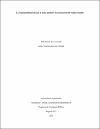La responsabilidad ética de la firma auditora en la detección del fraude contable
Resumen
La refinería REFICAR de Cartagena está catalogada como una de las empresas más modernas de Sudamérica dedicada a la refinación de petróleo, esta compañía inicio un proyecto de modernización y ampliación en el año 2006, durante este proceso se vio involucrada en el caso de corrupción con impacto en el país. Este trabajo busca analizar la responsabilidad ética de la firma de auditoría entre los años 2015 y 2016 aplicado al caso. Primero, el texto hace una breve contextualización del caso Reficar, parte de la historia del sector de hidrocarburos, los entes que lo controlan, administran, regulan y la descripción de los casos con más impacto de corrupción en Latinoamérica. Posteriormente, realiza una revisión de la literatura sobre la importancia ética en la auditoría, adicional se relaciona la responsabilidad ética del contador público y el marco regulatorio en Colombia, identifica las firmas con participación en el mercado y contextualiza las fallas en la auditoría con sus efectos en la toma de decisiones. Por último, presenta la metodología y emplea el análisis crítico del discurso (ACD) a los informes de gestión de REFICAR, la actuación especial de Contraloría General de la República (CGR) y se triangula con los diferentes puntos de vista de las notas de prensa, permitiendo identificar diferentes hallazgos con incidencia fiscal y administrativa, teniendo como resultado la falta de trasparencia y veracidad, de la información entregada a sus usuarios y pone en tensión el comportamiento ético de la firma de auditoría.
Abstract
The REFICAR refinery in Cartagena is ranked as one of the most modern companies in South America dedicated to oil refining, this company started a modernization and expansion project in 2006, during this process it was involved in the corruption case with impact on the country. This paper seeks to analyze the ethical responsibility of the auditing firm between the years 2015 and 2016 applied to the case. First, the text makes a brief contextualization of the Reficar case, part of the history of the hydrocarbon sector, the entities that control, manage, regulate it and the description of the cases with more impact of corruption in Latin America. Subsequently, a review of the literature on the ethical importance of auditing is made, in addition to the ethical responsibility of the public accountant and the regulatory framework in Colombia, identifying the firms with participation in the market and contextualizing the failures in auditing with their effects on decision making. Finally, it presents the methodology and uses the critical discourse analysis (CDA) to REFICAR's management reports, the special action of the Comptroller General of the Republic (CGR) and triangulates with the different points of view of the press releases, allowing to identify different findings with fiscal and administrative incidence, resulting in the lack of transparency and veracity of the information delivered to its users and puts in tension the ethical behavior of the auditing firm.
Palabras clave
Keywords
Collections
 This work is licensed under a Creative Commons Reconocimiento-NoComercial 4.0.
This work is licensed under a Creative Commons Reconocimiento-NoComercial 4.0.

